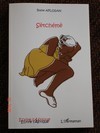|
IT WAS meant to be a friendly occasion earlier this month at State House in Nigeria’s capital, Abuja, where the president, Goodluck Jonathan, would thank foreign diplomats for their work. But he could not help himself, instead unleashing an angry broadside. Foreign representatives, he said, should correct what he deemed to be misconceptions abroad about his country. “The knowledge you have acquired here should be used positively to help us as you go back home,” he told the departing Italian ambassador. Few diplomats dispute that Nigeria is generally seen in a poor light by outsiders. It is a leader in advance-fee fraud over the internet, known globally as “419” after the relevant (and rarely enforced) section of Nigeria’s criminal code. Corruption is so endemic that many visitors pay their first bribe before they have even left the airport. Boko Haram, an Islamist extremist group, has kidnapped and killed numerous foreigners and has bombed the UN office in Abuja. Most of its victims are ordinary Nigerians, but other groups have kidnapped foreign oil men. One former British government minister estimated that 70% of all Nigerian visa applications are fraudulent. Nigerian peacekeepers on UN missions are often known for the efficiency with which they loot the places they are supposed to protect. Reactions in the rest of Africa to Mr Jonathan’s exhortation to foreign diplomats were predictably hostile. One caller on a Kenyan radio talk show called Nigerians “wordy, needy and domineering”. That seems unfair. As Africa’s most populous country, and arguably its most dynamic, Nigeria is bound to upset others. Its businessmen compete fiercely across the continent. Its “Nollywood” film industry swamps neighbours with cheap but popular fare. Aliko Dangote, a Nigerian often called Africa’s richest man, dominates the cement business. South Africa, long the continent’s economic and political powerhouse, is in danger of losing that title to Nigeria, thanks in part to the west African country’s ebullient energy. Many Nigerians swat away criticism as misrepresentation. Their government vigorously objected to a negative portrayal in the 2009 sci-fi film “District 9”, which showed a Nigerian resident in Johannesburg selling weapons to invading aliens and offering them prostitutes. Ministers in Abuja were so upset that they hired a public-relations firm to “undo the damage”. The best way to do that is surely for Mr Jonathan and his government to tackle their country’s manifold real-life problems. Last year the central bank’s well-regarded governor, Lamido Sanusi, told the president that $20 billion was missing from the accounts of the oil ministry—this in a country where most of its 170m citizens live on less than $2 a day. Mr Jonathan called the claim “spurious” and tried to sack the governor, who refused to go. |
« Afrique : Comment Sauver les Peuples des soi-disant Dirigeants ? | Accueil | TRAVAILLEURS ET PEUPLE EN LUTTE, VIGILANCE ! »
14 février 2014
L'utilisation des commentaires est désactivée pour cette note.
Les notes récentes
- Pour un Bénin Intègre, Dynamique et Juste : JaY 2016!
- Front Pour la Responsabilisation des Acteurs Publics: JYPPE 2016
- Bénin : Portrait Robot du Président en 2016
- 3 juil 2015 13:59:58
- France : A chacun son Egungun
- Tweet du Jour : Si « Institutions Complices » Veut dire Instrumentalisation, Alors c’est Raté
- Après Soro, Bientôt Hitler ou Pol Pot Pourront être Faits Dah à Titre Posthume au Bénin, ex-Danhomè
- Investiture de Me Adrien Houngbédji : Effet Critique d'un Discours de Sagesse
- Le Tweet du Jour : Soglo et son Numéro Gascon
- Monarchies, Rites et Temps : Tout Change et Rien ne Change
Holdup 2 Yayi !
- Holdup2Yayi
Jours
se sont écoulés
depuis le holdup
odieux perpétré par la bande des pilleurs diri gée par Yayi, valet-zombie de
la Françafrique
en terre du Bénin
Pages
- Archives & Catégories
- BABILOWN : BEST OF
- Babilown Essai 1
- Babilown Essai 2
- Babilown Essai 3
- Chronologie du royaume gun de Hogbonu
- Cliquer sur l'une des images ci-dessous pour accéder aux notes récentes
- Dix Instruments de Musique Béninois
- Dixit : Ils ont dit
- Etudes Dahoméennes 1
- Financement des partis politiques : Cas de la France et du Nigeria
- Flash-back sur le Tandem HOUNGBEDJI/LEHADY
- Haïku/Hovikléhoun
- HOMMAGE AU ROI GBÊHANZIN HÉROS NATIONAL
- La Haine de soi Dahoméenne en Chansons
- Le Livre Blanc sur l'Union Fait la Nation
- Les Dictateurs Africains
- Les Pensées de Blaise P., Intégrale
- Les Racines d'Obama
- LES TRIBULATIONS DU ROI KPOYIZOUN
- Liste des Députés
- Listes des Gouvernements Successifs du Président Yayi Boni de 2006 à 2010
- Où va le Bénin ?
- Page Philo 1 : Existentialism
- Pour l'Histoire /Consensus Mémoriel et Vérité Historique : Toffa et Béhanzin dans la Conscience Collective
- Pour l'Histoire : PRINCE SERGE AGBODJAN ; TÂCLES ET CONTRE-ATTAQUES CONSTITUTIONNELLES
- Pour L'HISTOIRE : COUP D’ETAT DU 26 OCTOBRE 1972 et AFFAIRE COVACS : Le Roman Crépusculaire de Pascal Chabi Kao
- Pour l'HISTOIRE : Le Roman Crépusculaire de Chabi Kao : Antoine Robert DETCHENOU Répond et Fait la Lumière
- Pour l'Histoire/LOUIS HUNKANRIN 1886 - 1964 : A DAHOMEYAN NATIONALIST ?
- Pour l'Histoire/LOUIS HUNKANRIN 1886 - 1964 : A DAHOMEYAN NATIONALIST ?
- Pour l'Histoire/LOUIS HUNKANRIN, le Nelson Mandela du Dahomey
- POUR LHISTOIRE/ Louis Hunkanrin, une Vie de Combat pour la Liberté.
- Supplique de Maria-Valentina, in Le Journal de Ouanilo
- The Raven/Le Corbeau, Edgard Allen Poe
- èmawolè-bienvenue
- ékpé
BeninInfo
Recherche
avril 2016
SETCHEME
SONGHAÏ
GO Benin
Technorati
Bénin-Tourisme
- Bénin-To
Catégories
- Actualité (81)
- Archives (8)
- Article (117)
- Bannière (32)
- Baro (3)
- BD (1)
- Bestof (2)
- Billet (37)
- Bio (1)
- Blogs (1)
- Brèves (1)
- Cinéma (6)
- concept (5)
- Cont-ext (282)
- Critique (148)
- Definitio (6)
- Diary (7)
- Dico (4)
- Docu (2)
- Dossier (25)
- Débat (30)
- Editorial (38)
- Essai (538)
- Ethic (11)
- Facto (6)
- Feedback (7)
- Fiction (140)
- haro (367)
- haïku (358)
- histo (228)
- hommage (127)
- humor (102)
- Idéo (456)
- Ilzondi (369)
- Image (379)
- Info (14)
- Interview (37)
- Jeux (2)
- Lecture (77)
- Lettre (97)
- Litté (249)
- Livravou (6)
- Livres (23)
- Media (3)
- Memory (153)
- Movies (248)
- Musique (109)
- novel (1)
- o'thentic (4)
- obituary (1)
- Onzeweb (2)
- Openculture (1)
- Pamphlet (505)
- Petites annonces (2)
- philo (1)
- porque (194)
- Press Link (86)
- Press Links (1252)
- Pub (289)
- Question & S (8)
- Recap7 (11)
- Religion (20)
- Repub (11)
- Santé (3)
- Science (28)
- Sensas (13)
- sketch (21)
- Sports (8)
- telex (12)
- Tou8 (333)
- Trad (178)
- télex (3)
- Télévision (3)
- Vif (3)
- Vox (9)
- Voyages (1)
- Weblogs (1)
- Witness (1)
- Y'en-a-marre (1)
- Émoiémoi (1)
- àTrad (86)
- étude (24)
Billet d'Afrique et d'Ailleurs
France Tv-Radio
France Tv-Radio
► Europe 1
► Radio France
► France Info
► RFI
► Arte
► BFM-TV
► BFM-Radio
► CNN
► Euronews
► France 2
► France 3
► France 24
► RFO
► Plein d'autres...
► Zapping du PAF
Soumbala Bénin-Livre
Langues Africaines
Le Chemin d'Agoué
Cour Constit.
Archive.Org
Libre Savoir
Sika-Info
IciLomé
Vacance à Biarritz
GNGWANE
AFRICAPHONIE
Charles Darwin
CVRA
O'BAOBAB
O-BAOBAB
Noces du Caméléon
CS-FDD-INFO
Bénin Mains Propres
Stand Up For Africa
- Stand Up For Africa
Les commentaires récents
- Zakari Dramani-Issifou de Cewelxa sur OBQ Met à Nu le Fantasme de Prix Nobel de la Paix derrière le Pseudo-Pacifisme de Tévoédjrè
- Thomas Coffi sur Janvier Yahouédéou Rassure le Bénin et sa Jeunesse, et Plaide pour une Gouvernance de l’Espoir
- Thomas Coffi sur Judas Contre Tartuffe : Sociologie de la Procuration des FCBE
- B.A. sur La Dynamique de l'Élection du Bureau de l’Assemblée : le Faux Gagnant et les Vrais Perdants
- Thomas Coffi sur La Dynamique de l'Élection du Bureau de l’Assemblée : le Faux Gagnant et les Vrais Perdants
- B.A. sur La Dynamique de l'Élection du Bureau de l’Assemblée : le Faux Gagnant et les Vrais Perdants
- Christophe Dossouvi sur La Dynamique de l'Élection du Bureau de l’Assemblée : le Faux Gagnant et les Vrais Perdants
- Thomas Coffi sur La Thématique de la Révision de la Constitution Chère à Yayi : Tel est Pris qui Croyait Prendre
- Thomas Coffi sur Le Tweet du Jour : Quand le Triste Sire Joël Aïvo Se Fait Philosophe du Temps, Autant en Emporte le Vent
- Thomas Coffi sur Bénin en Marche : Assemblée Nationale, les Deux “Houn” Dirigent le Parlement
Babilown Acro
Blog de
Aplogan
Blaise
Intransigeant
Libre
Original
Woofer
National
African Studies
MUSEE D'ABOMEY
SOSEKI : 夏目漱石
- SOSEKI : 夏目漱石
Mon amour a la couleur de la nuit Couleur des ténèbres Que vient visiter la lune
Global Voice
Le Kiosque
SOCIOLINGO
ODULAND
Catégories
- Actualité
- Archives
- Article
- Bannière
- Baro
- BD
- Bestof
- Billet
- Bio
- Blogs
- Brèves
- Cinéma
- concept
- Cont-ext
- Critique
- Definitio
- Diary
- Dico
- Docu
- Dossier
- Débat
- Editorial
- Essai
- Ethic
- Facto
- Feedback
- Fiction
- haro
- haïku
- histo
- hommage
- humor
- Idéo
- Ilzondi
- Image
- Info
- Interview
- Jeux
- Lecture
- Lettre
- Litté
- Livravou
- Livres
- Media
- Memory
- Movies
- Musique
- novel
- o'thentic
- obituary
- Onzeweb
- Openculture
- Pamphlet
- Petites annonces
- philo
- porque
- Press Link
- Press Links
- Pub
- Question & S
- Recap7
- Religion
- Repub
- Santé
- Science
- Sensas
- sketch
- Sports
- telex
- Tou8
- Trad
- télex
- Télévision
- Vif
- Vox
- Voyages
- Weblogs
- Witness
- Y'en-a-marre
- Émoiémoi
- àTrad
- étude
ÉTÈWUTU.com
- ETEWUTU.com
 Pourquoi ceci ? Pourquoi cela ? Tout ce que vous avez envie de savoir sur et autour du Bénin ... Osez le demander à ÉTÈWUTU.com
Pourquoi ceci ? Pourquoi cela ? Tout ce que vous avez envie de savoir sur et autour du Bénin ... Osez le demander à ÉTÈWUTU.com
Blog de Benoît Illassa
Regard sur le Bénin
Café Pédagogique
DICO-HISTOIRE
Pierre Bourdieu
Philo 24 h
Open Culture
Anazie
ADJAVIO
Canal U
Babelfeeds
Garde-Mots
Grandiose Parlor
Nigeria News Headlines
- Nigeria News Headlines
Ghana News Headlines
- Ghana News Headlines
Benin News Headlines
- Benin News Headlines
Béninculture
- Béninculture
Nelson Mandela Digital Archive
- Nelson Mandela Digital Archive
La Maison de l'Afrique
Solah Georgina Blog
- Solah Georgina Blog
Babilown Mawolè
Sowole Arts Blog
- Sowole Arts Blog
Google Ana
- Google Ana
art-BIVNZE
Pambazuka
- Pambazuka News
Passeur 2 Sciences
- Passeur 2 Sciences







Commentaires